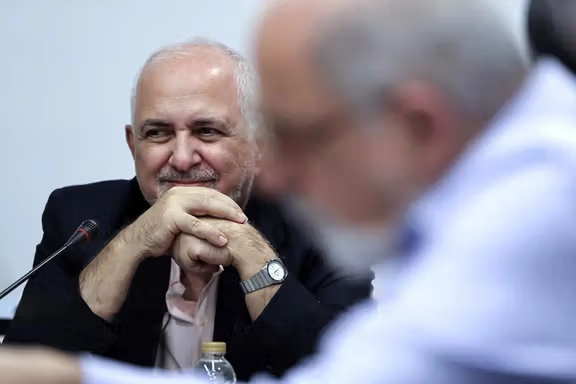Zarif calls for a dignified US-Iran deal which flatters Trump

Former Iranian chief negotiator Mohammad Javad Zarif said on Wednesday that a deal with Donald Trump is possible if it preserves Iran’s dignity and the US president’s ego.

Former Iranian chief negotiator Mohammad Javad Zarif said on Wednesday that a deal with Donald Trump is possible if it preserves Iran’s dignity and the US president’s ego.
“If we can design a dignified deal that protects Iran’s interests and satisfies Trump’s sense of self-importance, that could mark the end of the hostilities—and such a thing is possible,” Zarif told foreign-policy experts and reporters at a Tehran seminar on Wednesday.
The former foreign minister, who negotiated the 2015 nuclear agreement, suggested both Tehran and Washington sought to avoid a full-scale conflict in the June war with Israel, and defused it through back-channel communication.
“In the end, one side called at four in the morning and said, ‘We’re not going to strike,’ and the other replied, ‘We won’t strike either,’” Zarif recalled. “Wars end through dialogue, but it’s better if that dialogue happens when we still have leverage.”
His comments appear to counter hardliners’ calls to abandon diplomacy following US attacks on Iran’s nuclear sites and the Europeans’ snapback of UN sanctions last month.
Israel, not the US, wants Iran 'collapse'
Zarif argued that while Israel and the United States share interests, their strategic goals differ.
“America’s policy is not to bring about Iran’s collapse, but Israel —even during the Pahlavi era—believed that Iran was too big and must be broken apart,” he said.
The veteran diplomat said the continuation of the conflict could have led to Iran's collapse, in rare wording for a prominent former official.
“Continuing would either expand the war or lead to Iran’s collapse,” he said. “Both outcomes would have trapped America further in the region, which contradicts its policy.”
'People more important than missiles'
Zarif is President Masoud Pezeshkian’s closest aide and the moderates’ most prominent voice on foreign policy. Still, he holds no official position after he resigned as vice-president in March and is loathed by Iran's ascendant hardliners.
Yet he, like many others, avoided mentioning the role of Supreme Leader Ali Khamenei, who on the eve of Pezeshkian’s trip to New York ruled out any talks with the Trump administration.
He only alluded to Khamenei’s control when saying he was not authorized to negotiate beyond the nuclear issue during his tenure.
“Trying to solve the nuclear problem purely through the nuclear file is no longer possible. Back then it was, and that opportunity was wasted,” Zarif added, calling for “a broader framework” for other discussions, without elaborating.
Those “other discussions” may refer to Iran’s missile program—an issue Tehran has repeatedly said is off the table in any future talks.
“Missiles are important,” he said, “but people are more important. It’s the people who have kept Iran alive through the centuries.”